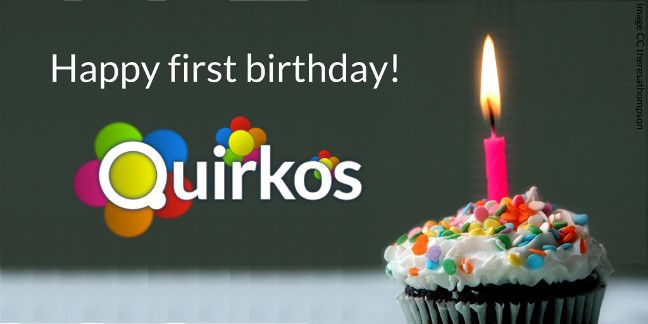Tips and advice from one year of Quirkos
This week marks the one-year anniversary of Quirkos being released to the market! On 6th October 2014, a group of qualitative researchers, academics and business mentors met in a bar in Edinburgh, and at 8pm, version 1.0 of Quirkos was launched to the world

This week marks the one-year anniversary of Quirkos being released to the market! On 6th October 2014, a group of qualitative researchers, academics and business mentors met in a bar in Edinburgh, and at 8pm, version 1.0 of Quirkos was launched to the world. We then drank the bar dry of Prosecco (Champagne being much too expensive). Now Quirkos is being used in more than 30 universities across the world, and it's so exciting to see how people have used it for their PhDs, or in major research projects.
Obviously, the story didn't begin on that October night. It was the cumulation of nearly 2 years of planning, testing and development, not just of software, but of the skills and networks of many people behind the scenes. This blog post is mostly intended to share some of the things that went wrong, what went right, and to provide encouragement to those starting down the road to their own business for the first time.
There are frightening statistics about how many start-ups fail in the first few years. Some say 20% in the first year, others as high as 50% in the first two years. Whomever you believe, the rates are high, and this has to be expected. It's a competitive world out there and the cost of starting a business is high, nearly always higher than people anticipate (Quirkos included in this).
Now, 3 years after I quit my job to work full time on Quirkos, it feels like we have beaten the odds (so far). I also know many start-ups that didn't make it, many colleagues in Edinburgh who were embarking on their own adventures, who saw their business fade during that time. But it's interesting that all those people have still done well individually. Whatever gave them that entrepreneurial desire has led them all to new and different things, just maybe not what they originally planned!
At the risk of adding to the 3752 (est) other lists of start-up advice on the internet, here are some numbered pointers:
1. Don't develop qualitative research software
This is annoyingly specific advice, but has become a bit of a running joke for me. If you want to get poor quickly, qualitative analysis software is ideal for you, there is not a lot of money in it. It's a niche, and a very un-sexy one at the moment too. People always suggest that Quirkos should branch out into 'big-data' or add more quantitative features, but this is not really what I want to do.
Qualitative research is what I am passionate about, and what I know best. I didn't start this project to make a fortune, but because I felt software was holding people back from better understanding the world, and that was a gap in the market (my pain point).
2. Advice is free, but guidance is invaluable
Fortunately, it's really easy to get advice and support. Government initiatives (at least in Scotland and the UK) provide lots of basic training workshops and materials for free. We've benefited from advice from Business Gateway and Scottish Enterprise and their partners on strategy, funding, IP, you name it. However, these people won't tell you what to do, and obviously don't have very specific knowledge for your industry.
That is where our great mentors have come in, with knowledge from our specific area (software) and in working with our main markets (public sector and academic). This allowed us to plan a lot better, and make much more realistic projections about things like conversion rates, lead times, and even cultural differences selling abroad.
3. Awareness is everything
Insulting though it may be, people don't go out looking for your product. They are looking for a solution to that problem, and at first they don't know your name is Quirkos. They search for 'qualitative analysis software' in Google, go to qualitative research conferences, and read journals on all manner of related disciplines. It is never enough to 'build it and they will come' – you have to go to where your potential users will be.
Awareness is just the first step, then you need people to believe that you can help them. That can only be done by yourself to a certain extent, word of mouth and recommendations are much more important than corporate-sponsored hearsay. That's why I think that quality and customer happiness are so important, because people don't really believe what they read in adverts (I know I don't).
4. You ultimately invest in yourself
The last few years have been a roller-coaster, but I have learned so much. I learnt about running a business, accounting, tax, sales, marketing, search engine optimisation, PHP, Javascript, SSL certification, social media, software testing, promotional printing, exhibitions, conferences, planning, strategy, and on and on.
I've always thought at the back of my mind, what if this fails? Is all that time and money lost? Well, yes, but through the experience I have learnt so much, and developed real skills in real situations. I can't say I was worried about finding employment afterwards, since I was always adding so much to my CV.
5. Getting funding costs money and time
However you want money: grants, competitions, loans, equity investment, all these things are very expensive in terms of time and paperwork. We spent a long time going to the final (term-sheet) stages of angel investment, before deciding that the timing wasn't right, and the costs of the transaction were going to be too high.
So you need to pick your battles carefully, but plan for redundancy. Assume that only 1 out of 3 sources of funding will come through, so always have a back-up ready to pursue. For Quirkos, a friends and family round worked really well for our first funding cycle, and allows us flexibility in the future.
6. Critical Path Analysis
I'm a little obsessed by this, but I have to admit, I actually learnt it from a children's book decades ago. It was 'Truckers' by Terry Pratchett, and it describes it thus: “It’s something called critical path analysis. It means there’s always something you should have done first. For example, if you want to build a house you need to know how to make bricks, and before you can make bricks you need to know what kind of clay to use. And so on”.
I actually do this in my head all the time now, whether I am doing a marketing strategy, releasing software or even making dinner. It just means working backwards from what you want to achieve, and working out the things that will hold you back if you don't get them done first. For example, if I am having flyers handed out at a conference, they need them 3 days before the conference. To get there, they have to be in the post 5 days before that. They take 3 days to come back from the printer, take me 1 day to design, and my colleague who has agreed to proof read them is on holiday next week. So quickly I can see that the last day I can do the first draft of the flyer is 17 days before the conference!
In a small business you end up doing everything, so being able to plan your time like this is essential. With experience, you also learn that the uncertain part in the chain is always when you have to rely on other people (who can be late, sick, forgetful) so you always factor in more time for the post, printers, and proof readers. Not that you won't be late, sick or forgetful yourself sometimes, but generally you know when this is happening. It's no coincidence that most of the 'Truckers' book is actually about managing people (seriously, it's the best management book I've ever read).
7. Network, network, network
Actually, I hate netwo rking, or at least that kind of endless socialising in large groups without direct purpose . But very targeted networking is essential to getting the word out, and cultivating positive relationships with key people and organisations is essential. A case-study or positive review is always more valuable than just a quick sale, and there are always influential people in any industry who have a large audience. Engaging with these networks is essential.
8. Love, love, love
I couldn't have done this on my own. Over the years so many people have given time, support, money and advice, and I can't thank them all here. If I was thinking in terms of social capital (Putnam style) I would have used up a lifetime of favours and goodwill. To be honest, I don't think I could have got this far without them, and the love and belief from friends, family, colleagues and spouse. So I'm going to finish on a song, and say “Thank You!”
“When you were giving me advice, that I seldom ever took
But your head never shook - That's love
Both knowing you were right, never shook it left and right
Just gave me that look - That's love
When I had to learn the hard way, and you would let me fall
But never did it out of spite - That's love
You told me never burn a bridge
If you build it, then you need it
Whether a river or a brook”
That's Love – Oddisee (from the album The Good Fight)
Performed live here from the awesome NPR Tiny Desk series!
